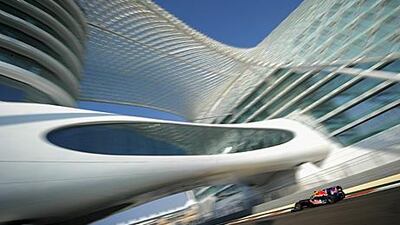Revving up televisions at wacko hours such as 5am in California and midnight in Sydney on Sunday, people from distant edges of the planet lay eyes upon what must have seen some high-speed wonderland.
If personal correspondence indicates, they went "wow" over Formula One cars raging near yachts, beneath futuristic edifices and around a hotel that made at least one amateur architecture critic in South America extol: "Amazing."
The sights must have been especially vivid for those possessing those flat-screens so gigantic as to be visible from other planets.
They also enhanced their consciousness of Abu Dhabi, all through the exploits of a bunch of young men driving in excess of 300kph and braking for 21 turns.
Revving up televisions on the booming South American continent tomorrow night, people from that distant region will lay eyes upon two groups of young men whom they cheer and about whom they complain.
Argentina will oppose Brazil in a friendly match in Doha as a booming part of the boom surrounding Qatar's bid for the 2022 World Cup, concurrent with an ongoing sport conference that will bring in such luminaries as Sir Alex Ferguson, the Manchester United manager, and legends of tennis Bjorn Borg and John McEnroe.
This will enhance the South Americans' consciousness of Qatar - a country of 1.6 million that refuses to let its size obstruct its vision - and all through the exploits of a bunch of young men running remarkable distances and looking for advantageous angles.
Even in 2010 and even with its frequent attempts to kill itself, sport still stands as the best means for letting other people know not only that you exist but that you exist with energy and ambitions.
Here are countries with the populations ranked No 114 (UAE) and No 159 (Qatar) in the world, majoring in asking the question, "Why not?"
Here are two countries that became sovereign within 90 days of each other in the latter part of 1971, Qatar in September and the UAE in December.
Yet here are two countries epitomising the world's rising balance and shrinking size.
Sport has demonstrated this before and consistently.
Barcelona said an emphatic hello to the world with its enchanting 1992 Summer Olympics, then spent the ensuing weeks seemingly amazed that the world had liked it even though you would have had to be a horrendous prude not to.
Sydney saw its 2000 Olympics as letting the world have a glimpse of it, and that glimpse too proved almost impossibly luminous as seemingly every citizen volunteered to help.
South Africa had a successful 2010 World Cup that showed anew its capacities.
Simply accessing a major event can bring recognition, as happened in 1990 when the UAE football team upset China and reached the World Cup in Italy and alerted many unaware people to its name.
It got added attention from a charmed Western media when its delegation brought along 10 camels for good luck.
Forward 20 years, and the UAE had that centre-of-the-cosmos feeling on Sunday at Yas Marina Circuit.
The energy and the urgency made it the sporting event you find from time to time, one so consuming that it takes the mind to some other place and answers the question of why people bother with this stuff.
Fast forward just 40 years from Qatar's sovereignty, and a report from Martin Rogers of Yahoo! Sports last weekend indicated this gumdrop of a country on a map looms as a considerable threat to the vast United States' aspirations toward World Cup 2022.
If chosen, its stadium technology would surpass anything on US soil.
It has grasped the idea that sport still retains the knack for luring eyeballs, so as the decision comes in December and for whatever happens beyond, many more people will know the name "Qatar" and might even be able to pronounce it correctly.

